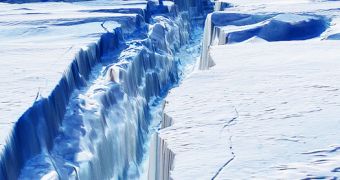A new study published in the journal Oceanography argues that global warming ups noise pollution levels. This in turn can affect the balance of natural ecosystems, especially those in the Antarctica.
A team of Oregon State University scientists explain that, as global ocean temperatures continue to increase, the Antarctica is starting to lose its glaciers and its ice sheets.
The problem is that all this ice doesn't just melt away. On the contrary, it first breaks into numerous bits and pieces, which are later on engulfed by oceanic waters.
By the looks of it, this phenomenon causes tremendous amounts of noise pollution.
Most people know that, when pouring room-temperature water or soda over ice cubes, the latter often crack before starting to melt and cooling the drink.
The same thing happens when the massive blocks of ice in the Antarctica come in contact with warm oceanic waters, except that this time, the noise that is produced reaches startling levels.
According to the scientists who have looked into this issue, certain marine animal species are likely to be affected by this new source of noise pollution just as much as they are by shipping, oil exploration and other noisy human activities.
“During one hour-long period, we documented that the sound energy released by the iceberg disintegrating was equivalent to the sound that would be created by a few hundred supertankers over the same period,” study leader Robert Dziak commented on his and his colleagues' findings.
“This wasn’t from the iceberg scraping the bottom. It was from its rapid disintegration as the berg melted and broke apart,” he further detailed.
The researchers claim that the noise produced when massive blocks of ice start to crack affects the surrounding environment in a way similar to that of earthquakes. For this reason, the specialists call these sounds “icequakes.”
As Robert Dziak explained, “We call the sounds ‘icequakes’ because the process and ensuing sounds are much like those produced by earthquakes.”

 14 DAY TRIAL //
14 DAY TRIAL //